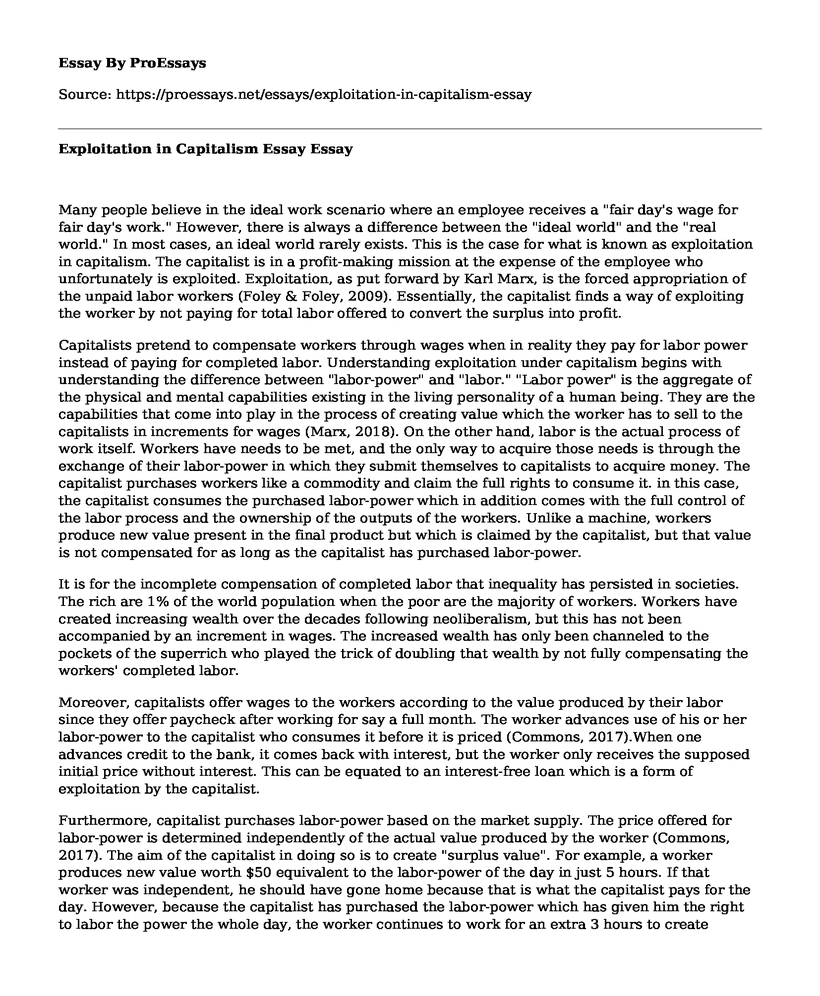Many people believe in the ideal work scenario where an employee receives a "fair day's wage for fair day's work." However, there is always a difference between the "ideal world" and the "real world." In most cases, an ideal world rarely exists. This is the case for what is known as exploitation in capitalism. The capitalist is in a profit-making mission at the expense of the employee who unfortunately is exploited. Exploitation, as put forward by Karl Marx, is the forced appropriation of the unpaid labor workers (Foley & Foley, 2009). Essentially, the capitalist finds a way of exploiting the worker by not paying for total labor offered to convert the surplus into profit.
Capitalists pretend to compensate workers through wages when in reality they pay for labor power instead of paying for completed labor. Understanding exploitation under capitalism begins with understanding the difference between "labor-power" and "labor." "Labor power" is the aggregate of the physical and mental capabilities existing in the living personality of a human being. They are the capabilities that come into play in the process of creating value which the worker has to sell to the capitalists in increments for wages (Marx, 2018). On the other hand, labor is the actual process of work itself. Workers have needs to be met, and the only way to acquire those needs is through the exchange of their labor-power in which they submit themselves to capitalists to acquire money. The capitalist purchases workers like a commodity and claim the full rights to consume it. in this case, the capitalist consumes the purchased labor-power which in addition comes with the full control of the labor process and the ownership of the outputs of the workers. Unlike a machine, workers produce new value present in the final product but which is claimed by the capitalist, but that value is not compensated for as long as the capitalist has purchased labor-power.
It is for the incomplete compensation of completed labor that inequality has persisted in societies. The rich are 1% of the world population when the poor are the majority of workers. Workers have created increasing wealth over the decades following neoliberalism, but this has not been accompanied by an increment in wages. The increased wealth has only been channeled to the pockets of the superrich who played the trick of doubling that wealth by not fully compensating the workers' completed labor.
Moreover, capitalists offer wages to the workers according to the value produced by their labor since they offer paycheck after working for say a full month. The worker advances use of his or her labor-power to the capitalist who consumes it before it is priced (Commons, 2017).When one advances credit to the bank, it comes back with interest, but the worker only receives the supposed initial price without interest. This can be equated to an interest-free loan which is a form of exploitation by the capitalist.
Furthermore, capitalist purchases labor-power based on the market supply. The price offered for labor-power is determined independently of the actual value produced by the worker (Commons, 2017). The aim of the capitalist in doing so is to create "surplus value". For example, a worker produces new value worth $50 equivalent to the labor-power of the day in just 5 hours. If that worker was independent, he should have gone home because that is what the capitalist pays for the day. However, because the capitalist has purchased the labor-power which has given him the right to labor the power the whole day, the worker continues to work for an extra 3 hours to create surplus value for the capitalist. In the 3 extra hours, the employee claims nothing from his or her labor, and that is pure exploitation.
Therefore, the capitalist exploits the worker by having him or her advance the labor-power which is compensated minus interest, partially compensated for the completed labor and deprived of the right to ownership of output, and worst overutilized to create surplus value. The capitalist offers wages which are compensation for labor-power when the employee actually presented more than labor-power and delivers value to the capitalist represented in output solely claimed by the capitalist. Also, capitalist pays the worker after deriving a value from the labor-power but without consideration for advanced credit. The worker works for almost twice what is paid for the labor in a day to create surplus value for the capitalist.
References
Commons, J. R. (2017). Legal foundations of capitalism. Routledge.
Foley, D. K., & Foley, D. K. (2009). Understanding capital: Marx's economic theory. Harvard University Press.Marx, K. (2018). Capital volume 1 (Vol. 1). Lulu. com.
Cite this page
Exploitation in Capitalism Essay. (2022, Feb 18). Retrieved from https://proessays.net/essays/exploitation-in-capitalism-essay
If you are the original author of this essay and no longer wish to have it published on the ProEssays website, please click below to request its removal:
- Impact of Globalization on Emerging Markets - Essay Example
- Essay Example on the Theory of Consumers' Choice
- GDP and Shadow Economy Essay
- Essay Sample on Importance of Human Capital and Employee Engagement
- Research Paper on Globalization: A Historical Perspective
- The Great Recession: Comparing Causes in the US and Iceland - Essay Sample
- Paper on Healthcare Staffing: Optimizing Patient Ratios for Better Outcomes







